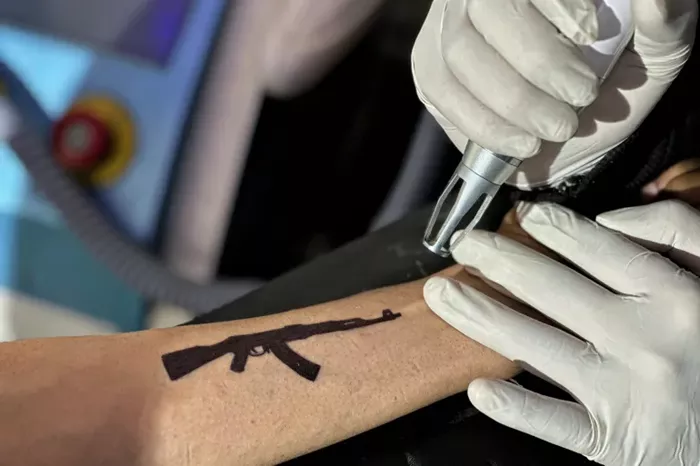In a dimly lit laser clinic in Srinagar, the largest city in Indian-administered Kashmir, Sameer Wani watches intently as the word “Azadi” — Urdu for “freedom” — fades from his forearm under the crackle of a laser beam.
Once a bold symbol of defiance against Indian rule, the tattoo now feels like a liability.
“I was lucky he couldn’t read Urdu,” Wani, 28, recalls, describing a moment when Indian security personnel stopped and frisked him at a checkpoint. “It was a close call. I knew then that this tattoo could get me into serious trouble.”
Wani, like many young Kashmiris, once saw tattoos as personal emblems of strength, identity, or political sentiment. But growing tension in the disputed region has prompted a quiet but growing trend: the removal of politically charged tattoos.
“It doesn’t represent who I am anymore,” Wani said. “It’s not worth the risk. It’s not worth hurting my future.”
Tattoos of Resistance Become Liabilities
The trend, already emerging in recent years, has intensified following a deadly attack in April that killed 26 people in Pahalgam, a scenic resort town in Indian-administered Kashmir. The incident pushed India and Pakistan — long-time rivals who have fought three wars over Kashmir — to the brink of another military confrontation.
Two weeks later, India launched a series of missile and drone strikes on what it called “terror camps” in Pakistan and Pakistan-administered Kashmir, marking the most significant cross-border escalation since the 1971 war. The standoff deescalated only after U.S. President Donald Trump brokered a ceasefire on May 10.
But tensions remain high on the ground. Indian forces have intensified operations in Kashmir, demolishing homes of suspected militants, conducting mass raids, and arresting more than 1,500 people under preventive detention laws since the Pahalgam attack.
“Every time something happens between India and Pakistan, we feel it on our skin — literally,” said Rayees Wani, 26, a resident of Shopian district.
Rayees bears a tattoo of Hurriyat leader Syed Ali Shah Geelani’s name — a homage to the separatist icon who died in 2021. Since the recent violence, he has been receiving unwanted attention at checkpoints and from neighbors.
“Even my friends ask uncomfortable questions,” he said. “I just want to live without having to explain myself all the time.”
Growing Demand for Tattoo Removals
Across Kashmir, tattoo removal clinics have seen a steady uptick in clients. Bookings, once rare, now require weeks of advance planning.
Arsalan, a 19-year-old from Pulwama, said he scheduled a session after noticing increased scrutiny of those with politically themed tattoos. “People fear being profiled or questioned,” he said. Like many others, he chose not to reveal his full name, citing concerns over retaliation.
While tattoo parlors in Kashmir remain busy — especially among clients aged 22 to 40 — the styles have changed. Political and religious motifs are being replaced with minimalist designs, nature themes, or quotes in artistic fonts.
Some, like Irfan Yaqoob, say the decision to erase tattoos reflects personal growth. Now 36, Yaqoob got the name of a slain rebel inked on his arm as a teenager.
“Back then, it felt like a symbol of courage,” he said. “Now, I have a family and a job. I don’t want my past to affect my present.”
Others see the tattoos as painful relics of a turbulent youth. For some, they’ve become roadblocks to professional aspirations.
Talib, 25, who revealed only his first name, had a tattoo of a Quranic verse shaped like an AK-47 rifle. He began wearing long sleeves after a family member in law enforcement hinted that the tattoo could harm his chances of securing a government job.
“I got a lot of rejections. No one ever said it was because of the tattoo, but I knew,” he said. “It felt like a wall between me and my future.”
Faith and Family Pressure Also Key Factors
Religious beliefs are also motivating removals. In the Muslim-majority region, tattoos featuring Quranic verses or political symbols are increasingly seen as conflicting with Islamic teachings.
Faheem, 24, said he tattooed a Quranic verse on his back at 17 as an expression of faith. Years later, the ink felt like a source of guilt.
“I felt uneasy every time I prayed,” he said. “Getting it removed was my way of making peace with myself and my faith.”
Religious scholars in the region say they’re frequently approached by youth questioning the acceptability of tattoos in Islam. While past choices are not harshly judged, many are advised to align their actions with current beliefs.
“When someone realizes their past doesn’t align with their present values, and they take steps to change, it’s maturity — not shame,” said Ali Mohammad, a cleric in Srinagar.
Family influence is another driving force. Anas Mir, 25, had a tattoo of a sword with “Azadi” inscribed on it. “I removed it because of pressure from my family,” he said. “People should be free to express themselves, but the reality is, it’s not always safe.”
Between Expression and Consequences
While tattoo culture still thrives in Kashmir, the evolving political climate and societal expectations have forced many to reconsider what they once wore with pride.
“I don’t regret who I was,” said Yaqoob. “But I’ve changed. Life has changed. And that should be okay.”
As laser clinics remain booked and security concerns persist, the decision to remove tattoos is no longer simply cosmetic — for many young Kashmiris, it has become an act of self-preservation.
Related topics:

